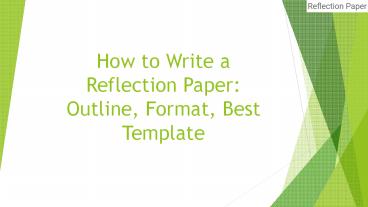How to Write a Reflection Paper: Outline, Format, Best Template - PowerPoint PPT Presentation
Title:
How to Write a Reflection Paper: Outline, Format, Best Template
Description:
Reflection paper writing can be hard, that's why created this presentation to show you how to write it, how to make outline, what format to choose and what is the best template for reflection paper. – PowerPoint PPT presentation
Number of Views:94
Title: How to Write a Reflection Paper: Outline, Format, Best Template
1
How to Write a Reflection Paper Outline, Format,
Best Template
2
- A reflection paper is a formal essay about your
thoughts, ideas, and reactions to the reading
some book, article, lecture or experience. You
can write what you observed and how this
literature or experience helped you to understand
some material.
3
- A reflection paper is not like a book report
where you need to summarize what you read. It is
about what knowledge you got from that reading or
experience and whether it changed your opinions
on the topic.
4
How to write a reflective essay? To find out
that, read the following tips on reflection paper
outline and format.
- Define the major themes
- Make notes for yourself write a summary of a
book, article, lesson or experience (2-3
informative but up to the point sentences). Ask
for professional reflective essay help, if you
have any writing troubles.
5
- Create a table and include there your ideas
- To keep track of your thought after the reading,
it is very helpful to create a chart or a table.
In the first column, list the key points which
the author or speaker wrote or told as well as
essential details which support these ideas.
6
- In the second column, write your own response to
each of these points from the first column.
Include there your personal beliefs and
experiences which influence your response.
7
- A reflection paper writer should ask himself the
following questions - What issue did the author bring up?
- What is the authors key point?
- How did the author back up his arguments?
8
- What strengths and weaknesses of the authors
opinion on the topic? - After the reading, have you changed your way of
thinking on the topic? Did it have any conflicts
with your previous beliefs and values?
9
- Have this book, lecture or experience changed
you? Does it bother you? What grabs your
attention? - Do ideas and thoughts brought up in the book or
any other source contradict or support each other?
10
- Stick to the word limit. Usually, good examples
of reflective writing are 300-700 words long. Ask
your supervisor what requirements are towards its
length and keep your written piece concise and
sweet.
11
- One of the worst mistakes in writing a reflective
paper is to leave the reading your source and
writing a reflection paper until the last minute.
12
- You need to have enough time after the reading to
think thoroughly on the topic (you can reread the
text even twice if needed). So, schedule in
advance and make sure you can accomplish
everything within a deadline.
13
- Introduction
- In this part of a reflection paper, you need to
specify the main points youre going to write
about in the next sections. Tell what you
expected at the beginning to read in a book based
on its title or introduction.
14
- Start with a discussion what makes you read this
particular book, what you were feeling, and your
impressions after you finished reading. Sum up
all of these in a thesis statement.
15
- In a thesis statement, write whether your
expectations were met after the reading. Make it
short and succinct. Ideally, it takes one
sentence (maximum two) like in this example of a
reflection paper.
16
- Some students prefer to write the body paragraphs
first. They know how to start an opening sentence
after theyve listed all ideas and thoughts. Its
up to you so choose what is better for you and
check this reflective assignment example .
17
- Body Paragraphs
- It should be about your understandings and
conclusions you got after the reading. Provide
all necessary details and write a separate
paragraph for each of your idea.
18
- Support what youre writing by quoting from the
original source. But make sure youre citing
properly and according to the academic citation
style.
19
- Conclusions
- Concisely summarize your feelings and
understandings you reached after the reading or
having an experience. If it changes your actions
in the future or your views on the topic, explain
how and why. Leave your reader with something
he/she can think about the subject. - Find even more information on the topic in this
Google book.
20
- Want to know more?
- Check
- reflectionpaper.com
- right now!































